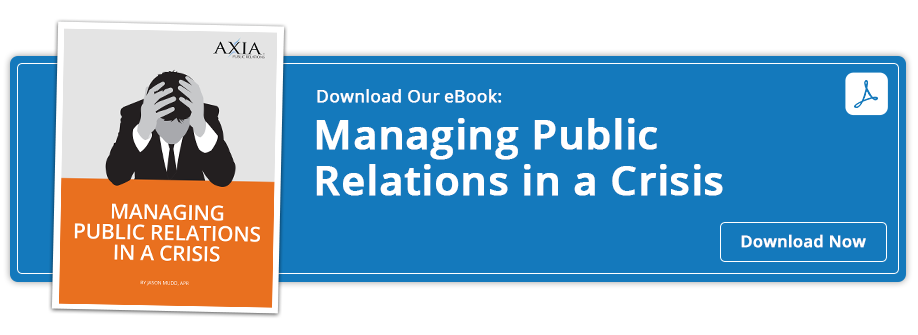What percentage of your PR budget should you spend on proactive crisis management?
By Lisa GoldsberryJune 7, 2016
 It depends on how much you want to avoid (or survive) your next crisis
It depends on how much you want to avoid (or survive) your next crisis
Ben Franklin said, “An ounce of prevention is worth a pound of cure.” Indeed, it is much easier to safely extinguish a campfire with water and soil than it is to battle a raging forest fire. You can say the same for crisis management.
Every crisis has two components: preparedness and response. Having a crisis management plan can help your company get through a situation faster and back on the road to success and growth. But is it worth the time and expense? After all, how often will you even use it? The answer is yes, you need a good proactive strategy that is operative, transparent and seamless, and you will use it all the time.
4 reasons why proactive crisis management is vital
- You may be forced to answer questions before you are ready. Just a few years ago, you might have only had to worry about the morning, afternoon and evening news schedules. Now, news is a 24-hour operation; breaking news happens constantly; and journalists expect to be able to reach you at any time. Just throwing your CEO in front of the cameras during a crisis will not work without a solid, well-prepared communication plan.
- Proactive costs less than reactive. For example, suppose an employee decides to sue your company for harassment or discrimination. You could spend tens of thousands of dollars in legal fees or considerably less on anti-discrimination workshops and legal compliance training.
- Studies have shown that approximately 40 percent of companies that face a major crisis won’t survive it.
- A crisis can happen to any company at any time. It doesn’t have to be as big as the BP oil spill or Tylenol cyanide crisis to be devastating to your company. The loss of a huge client, an inadvertent remark by the CEO, computer hackers stealing personal data or a freak accident involving your product could all serve to damage your reputation and decrease your profits.
How to be proactive on crisis management
- Develop a crisis management plan. It should cover all possible scenarios and what you will do if they occur. You should also include your media policies, communication protocols and contact information for all key personnel.
- Practice your crisis management plan. A plan is only good if it is effective. Run drills to see how your plan would work in real time.
- Form a crisis management team. This should consist of the CEO, vice president(s), communication and PR representatives, a well-trained spokesperson and your attorney.
- Hire a PR agency to help you. Many companies only think of public relations when they want to attract media or after a crisis has gotten out of control. However, PR is not something you put on a shelf until the next news event or disaster. It must be fully integrated into your company’s overall strategic plan to help meet your goals (and stay out of trouble).
Let the professionals at Axia Public Relations be your tactical partners before, during or after a crisis. We will help to develop the right budget for you to monitor and defend your reputation, craft the right messages and get back on track. To learn more, contact us today or download our e-book Managing Public Relations in a Crisis.
 Lisa Goldsberry is a blogger for Axia Public Relations with more than 15 years of public relations experience. She specializes in business and technology PR. Lisa has worked for Axia since December 2013. Learn more about Lisa Goldsberry. Connect with Axia on Twitter @axiapr or tell us what you think in the comments below.
Lisa Goldsberry is a blogger for Axia Public Relations with more than 15 years of public relations experience. She specializes in business and technology PR. Lisa has worked for Axia since December 2013. Learn more about Lisa Goldsberry. Connect with Axia on Twitter @axiapr or tell us what you think in the comments below.
Featured image credit: 123rf.com
Topics: public relations, reputation management, crisis communications



Comment on This Article